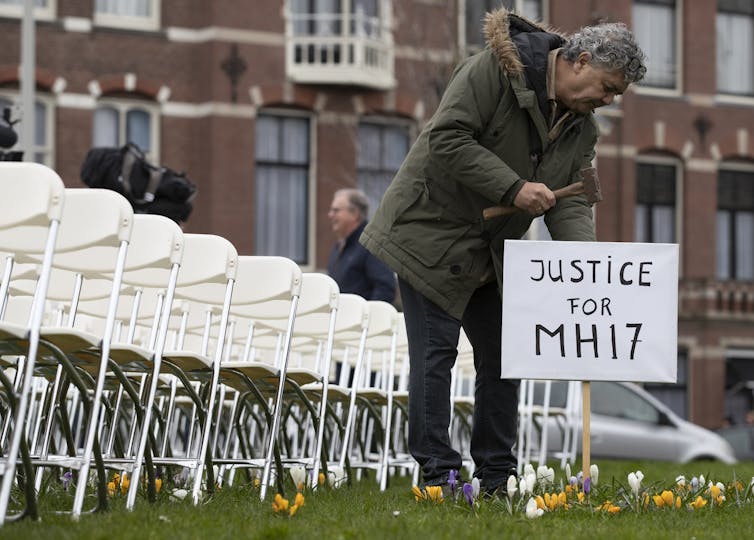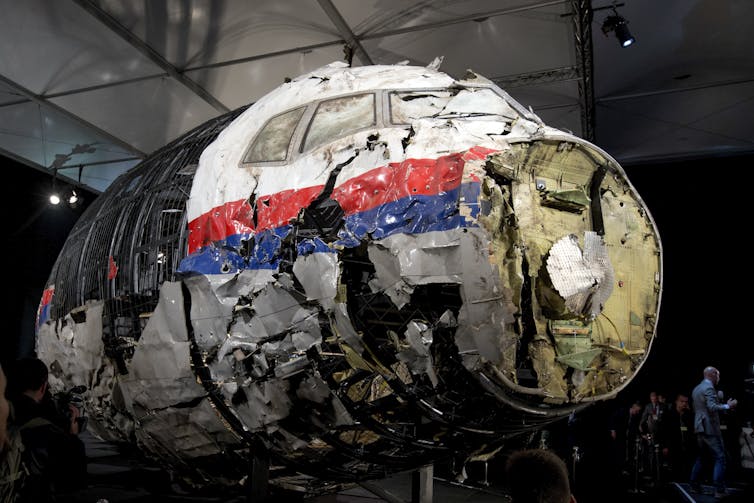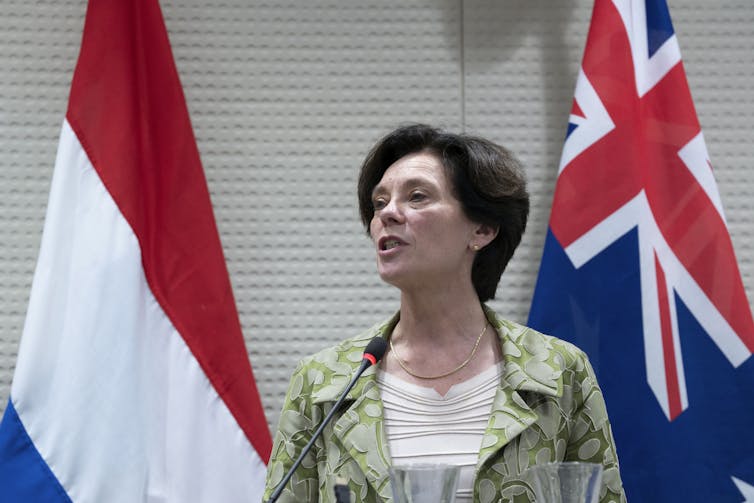
Amy Maguire, University of Newcastle
The investigation into the downing of Malaysian Airlines flight MH17 has found “strong indications” that Russian President Vladimir Putin authorised the supply of the missiles used by separatists to shoot down the plane.
However, the joint investigative team leading the investigation said it has reached the limits of its investigation, largely due to Russia’s refusal to cooperate. At this time, it will not initiate further prosecutions.
What investigators looked at
On July 17 2014, flight MH17 was travelling from Amsterdam to Kuala Lumpur when it was shot down over eastern Ukraine. All 298 people onboard were killed.
This atrocity shocked the international community and raised many questions of legal responsibility that are
.One early response was the formation of the joint investigative team, which brought together investigators and prosecutors from five countries most affected by the tragedy – The Netherlands, Ukraine, Malaysia, Australia and Belgium. Its role was to carry out the “full, thorough and independent international investigation” called for by the UN Security Council.

The team’s work was complex and protracted, particularly as the crash site was located in a conflict zone. It was mid-2015 when the investigators gained proper access to the site in Ukraine. They subsequently questioned 200 witnesses and intercepted and analysed 3,500 conversations. The team also studied 20 weapons systems and scrutinised five billion internet pages.
Ground samples were taken in various international locations and missile launch sites were simulated in the five countries leading the investigation. Thousands of parts from the plane wreckage were examined.
The key initial finding was the plane was shot down by a missile launched by a BUK-TELAR system, located on farmland in an area of Ukraine controlled at the time by pro-Russian separatists. The investigators determined the missile and launcher were transported from Russia before the attack and returned there afterwards.

Dutch criminal prosecution
One important outcome of the team’s work was the prosecution of four separatist fighters in the Netherlands. Three of them – Igor Girkin, Sergey Dubinskiy and Leonid Kharchenko – were found guilty last year of bringing down the plane and murdering all 298 people onboard.
Prosecutors did not allege the men had pressed the launch button for the missile, but that they played significant roles in transporting, positioning and returning the missile launcher to Russia.
The men received
of life imprisonment and were ordered to pay more than 16 million euros (A$24.7 million) in compensation to the victims’ families. But since they were tried in absentia, it is highly unlikely any of them will face a real penalty.Putin’s potential involvement
The report released this week by the MH17 investigation team focused on the crew members responsible for the missile launcher and those above them in the chain of command.
While the investigators uncovered considerable information about the decision-making before the plane was shot down, the evidence was insufficient to prosecute further suspects. The key problem is access to information: Russia has consistently refused to accept responsibility and has prevented the investigators from gathering evidence from Russian nationals. Russia is also accused of falsifying evidence.
Investigators believe the launcher crew were members of the 53rd brigade of the Russian military, based in Kursk. It seems likely those crew members, if they were available for questioning, could explain what their assignment was in Ukraine and why MH17 was shot down.
The team also found evidence the separatists were in touch with Russian intelligence and the Kremlin. They requested, and were granted, access to heavier air defence systems. Investigators believe Russia was actually in control of the “Donetsk People’s Republic” separatist movement in July 2014. Russia denies this.
However, it’s Putin’s potential involvement that’s capturing the most attention.
According to investigators, there are “strong indications” Putin decided to supply the BUK-TELAR launcher to the separatists.
Intercepted phone calls served as evidence that Putin is the only person with authority to approve the provision of heavy air defence systems like the BUK-TELAR to the separatists. The team believes Putin authorised the delivery of even heavier air defence systems, but it does not have conclusive enough evidence to pursue charges.
In any case, at the moment, Putin enjoys head of state immunity.
Can Russia still be held accountable?
While the investigation is now suspended, it could be revived in the future. Investigators said they are available to receive evidence from the Russian authorities or Russian witnesses, and that further information could lead to future prosecutions.
Digna van Boetzelaer, deputy chief public prosecutor of The Netherlands, reflected on what the team has achieved to date:
The purpose of this investigation was to find out the truth, and I think we have come further than we ever imagined in 2014.
The bar for establishing individual criminal liability is high. At the moment we do not meet that bar for the persons discussed in the remaining investigation.
The findings we have uncovered about the Russian involvement up to the highest level can play an important role in proceedings where the liability of this state is at issue.
Van Boetzelaer’s last comment references other judicial actions that are still ongoing in relation to MH17.
One of these is an action launched by Ukraine and The Netherlands against Russia in the European Court of Human Rights. That court delivered an interim ruling last month that attributes some responsibility to Russia for crimes committed on Ukrainian territory.
Meanwhile, Australia and The Netherlands have launched a separate action against Russia before the International Civil Aviation Organization.
Ukraine is also pursuing an action against Russia before the International Court of Justice. It claims Russia financed terrorist acts by separatists and is responsible for gross humanitarian violations against Ukrainian civilians.
All of these actions are operating in the increasingly complex and tragic circumstances of Russia’s full-scale invasion of Ukraine and the ongoing war there. But as Australian Foreign Minister Penny Wong stressed this week, the countries impacted by the tragedy remain committed to holding Russia accountable.![]()
Amy Maguire, Associate Professor in Human Rights and International Law, University of Newcastle
This article is republished from The Conversation under a Creative Commons license. Read the original article.

